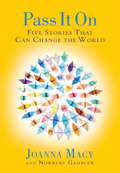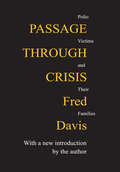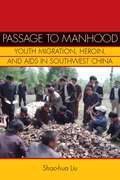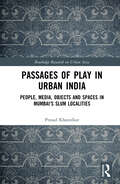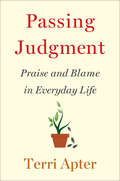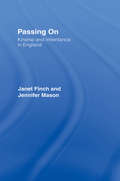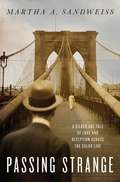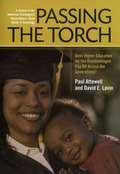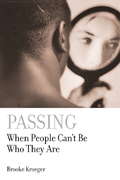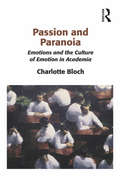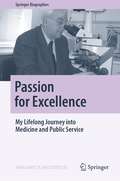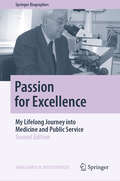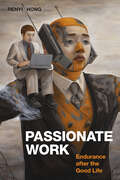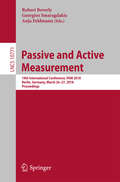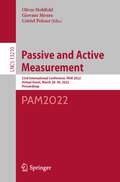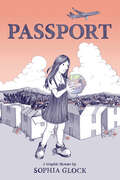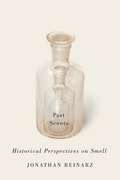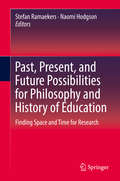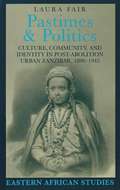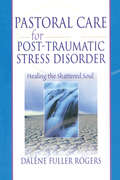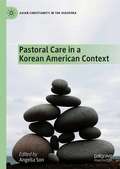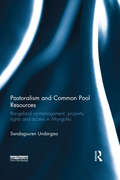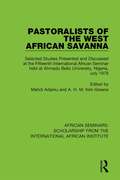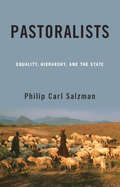- Table View
- List View
Pass it On: Five Stories That Can Change the World
by Joanna Macy Norbert GahblerEco-philosopher and best-selling author Joanna Macy, Ph.D., shares five stories from her more than thirty years of studying and practicing Buddhism and deep ecology. Gathered on her travels to India, Russia, Australia, and Tibet, these stories give testament to Joanna Macy's belief that either humankind awakens to a new and deeper understanding of our interconnectedness with our planet and all its myriad forms of life or risks loosing it. To bring about such a transformation of consciousness each and every one of us counts. Five Stories that Can Change the World tells of encounters with individuals who share very personal stories of sudden awakening, unexpected awareness, and the co-mingling of joy and pain. Each story is imbued with the specific cultural flavor of the places where the stories originate, but all share that each individual counts in the global need for change and awakening.Pas It On provides an introduction to Joanna Macy's work of "deep ecology" and "the great turning" and the deep interconnected nature of all beings.Introduction by Norbert Gahbler.
Passage Through Crisis: Polio Victims and Their Families
by Fred DavisBased on a study of fourteen families in which a child had contracted paralytic poliomyelitis. Passage Through Crisis: Polio Victims and Their Families, first published in 1963, was widely praised for its penetrating--and, for its time, innovative--analyses of doctor-patient communications, and for its interpreta-tion of the meaning of physical disability in American society. In his new opening essay, Davis reflects on the enduring sources of this profound problem in human relations as well as on those changes in the culture of American health care that are helping to restructure doctor-patient relations along more open, less authoritarian lines. The emergence of patient self-help groups, the political militancy of the Gay community in regard to AIDS, and the fading of the early post-World War II naive faith in the humanitarian efficacy of science are some of the developments dealt with. A parallel discussion of the importation into medical sociology of such concepts as the reality-structuring power of professional discourse and of the meta-phoric significance of different diseases for different historical eras seeks to relate developments in the culture of health care to sociology's study. Passage Through Crisis retains for today's readers that essential quality that most engaged readers of a quarter century ago: its vivid and probing ethno-graphic account of the impact of serious illness on the family, the difficult processes of adjustment that ensue and, in these connections, the role played (and toll exacted) by American values.
Passage to Manhood: Youth Migration, Heroin, and AIDS in Southwest China
by Shao-Hua LiuPassage to Manhood addresses the intersection of modernity, heroin use, and HIV/AIDS as they are embodied in a new rite-of-passage among young men in the Sichuan province of southwestern China. Through a nuanced analysis of the Nuosu population, this book seeks to answer why the Nuosu has a disproportionately large number of opiate users and HIV positive individuals relative to others in Sichuan. By focusing on the experiences of Nuosu migrants and drug users, it shows how multiple modernities, individual yearnings, and societal resilience have become entwined in the Nuosu's calamitous encounter with the Chinese state and, after long suppression, their efforts at cultural reconstruction. This ethnography pits the Nuosu youths' adventures, as part of their passage to manhood, against the drastic social changes in their community and, more broadly, China over the last half century. It offers fascinating material for courses on migration, globalization, youth culture, public health, and development at both undergraduate and graduate levels.
Passages of Play in Urban India: People, Media, Objects and Spaces in Mumbai's Slum Localities (Routledge Research on Urban Asia)
by Prasad KhanolkarIn this book, Prasad Khanolkar offers a new way of thinking about ‘slums’ and southern cities based on a grounded engagement with the relationship between media, objects, spaces, and people in the everyday life of slum localities in Mumbai, India. Over the past few decades, Mumbai, like many cities in the global South, has experienced a series of overarching governmental missions to program it into an interoperable and profitable city. Its ‘slums’, which house a majority of its population don’t fit within the dominant registers and continue to be deemed as excess. Urban residents inhabiting Mumbai’s slum localities thus find themselves in the middle of missions, policies, and programs that are not of their making, just as often that they find themselves localized by lack of resources, caste system, communal conflicts, and territorial jurisdictions. Drawing on extensive fieldwork in slum localities of Mumbai, this book explores how its residents engage in different forms of play in order to extend and expand their field of possibilities, despite the limitations and fixities. The book attends to some of these playacts: imparting stories with different thicknesses, rehearsing roles on and offscreen, engaging in deceptive performances, experimenting with repetitive everyday rhythms, and recycling matter and forms. Through these playacts, urban residents explore the virtual abilities of different mediums to put bodies, objects, and spaces into new forms of relationships and create passages to depart from programmed urban futures. By attending to these proliferating urban passages of different residents in slum localities, the book makes a case for rethinking southern cities as mediums for urban lives to converge and depart without an overarching framework. The book makes a significant contribution in the field of urban studies, urban anthropology, urban geography, and urban sociology. It will be of interest to scholars and students working on postcolonial cities, Southern urbanisms, infrastructure studies, and urban planning in the global South.
Passages: Predictable Crises of Adult Life
by Gail SheehyGail Sheehy identifies the predictable crises of adult life.
Passing Judgment: The Power Of Praise And Blame In Everyday Life
by Terri ApterTerri Apter reveals how everyday judgments impact our relationships and how praise, blame, and shame shape our sense of self. Do you know that praise is essential to the growth of a healthy brain? That experiences of praise and blame affect how long we live? That the conscious and unconscious judgments we engage in every day began as a crucial survival technique? Do you think people shouldn’t be judgmental? But, how judgmental are you, and how does this impact your relationships? “Keenly perceptive” (The Atlantic) psychologist and writer Terri Apter reveals how everyday judgments impact our relationships, and how praise, blame, and shame shape our sense of self. Our obsession with praise and blame begins soon after birth. Totally dependent on others, rapidly we learn to value praise, and to fear the consequences of blame. Despite outgrowing an infant’s dependence, we continue to monitor others’ judgments of us, and we ourselves develop what relational psychologist Terri Apter calls a “judgment meter,” which constantly scans people and our interactions with them, and registers a positive or negative opinion. In Passing Judgment, Apter reveals how interactions between parents and children, within couples, and among friends and colleagues are permeated with praise and blame that range far beyond specific compliments and accusations. Drawing on three decades of research, Apter gives us the tools to learn about our personal needs, goals and values, to manage our biases, to tolerate others’ views, and to make sense of our most powerful, and often confusing, responses to ourselves and to others.
Passing On: Kinship and Inheritance in England
by Jennifer Mason Janet FinchInheritance, once the preserve of the propertied upper classes, has become a much more common experience. Many more people now than in the past have something of material value to bequeath when they die, mainly because of the spread of home ownership during the second half of the twentieth century. Passing On examines what these changes can tell us about kinship in England, through a study of how contemporary families handle inheritance. Based on the findings of a major research project into inheritance and kinship, Passing On examines how it is transmitted, 'who gets what' and the meaning this has for individuals and families. The authors argue that we should understand English kinship as a set of relational practices which are flexible and variable, rather than as a rigid structure or system. Inheritance is characterised more by symbolic practices and moral reasoning than by materialism. Of interest to lecturers and students of sociology, anthropology, social policy, law and gender studies, Passing On is also of considerable interest to those seeking to understand changing forms of kinship and ownership, especially researchers, policy makers and legal practitioners.
Passing Strange: A Gilded Age Tale of Love and Deception Across the Color Line
by Martha A. Sandweiss"Passing Strange" is a uniquely American biography of Clarence King, who hid a secret from his Gilded Age cohorts and prominent family: for 13 years he lived a double life--as the celebrated white explorer, geologist, and writer King and as a black Pullman porter and steelworker named James Todd.
Passing the Torch: Does Higher Education for the Disadvantaged Pay Off Across the Generations?
by Paul Attewell David Lavin Tania Levey Thurston DominaThe steady expansion of college enrollment rates over the last generation has been heralded as a major step toward reducing chronic economic disparities. But many of the policies that broadened access to higher education—including affirmative action, open admissions, and need-based financial aid—have come under attack in recent years by critics alleging that schools are admitting unqualified students who are unlikely to benefit from a college education. In Passing the Torch, Paul Attewell, David Lavin, Thurston Domina, and Tania Levey follow students admitted under the City University of New York’s "open admissions" policy, tracking its effects on them and their children, to find out whether widening college access can accelerate social mobility across generations.Unlike previous research into the benefits of higher education, Passing the Torch follows the educational achievements of three generations over thirty years. The book focuses on a cohort of women who entered CUNY between 1970 and 1972, when the university began accepting all graduates of New York City high schools and increasing its representation of poor and minority students. The authors survey these women in order to identify how the opportunity to pursue higher education affected not only their long-term educational attainments and family well-being, but also how it affected their children’s educational achievements. Comparing the record of the CUNY alumnae to peers nationwide, the authors find that when women from underprivileged backgrounds go to college, their children are more likely to succeed in school and earn college degrees themselves. Mothers with a college degree are more likely to expect their children to go to college, to have extensive discussions with their children, and to be involved in their children’s schools. All of these parenting behaviors appear to foster higher test scores and college enrollment rates among their children. In addition, college-educated women are more likely to raise their children in stable two-parent households and to earn higher incomes; both factors have been demonstrated to increase children’s educational success.The evidence marshaled in this important book reaffirms the American ideal of upward mobility through education. As the first study to indicate that increasing access to college among today’s disadvantaged students can reduce educational gaps in the next generation, Passing the Torch makes a powerful argument in favor of college for all.
Passing: When People Can't Be Who They Are
by Brooke KroegerThrough the provocative stories of six contemporary passers, and examples from history and literature, a renowned journalist illuminates passing as a strategy for bypassing prejudice and injustice
Passion and Paranoia: Emotions and the Culture of Emotion in Academia
by Charlotte BlochAnalysing emotions and emotion-management in the academic organization, Passion and Paranoia shows how focusing on emotions in organizations can offer insights into important aspects and the dynamics of organizational processes. Drawing on rich interview material, this book demonstrates the often-overlooked importance of emotions in academic life, to reveal the manner in which emotion contributes to social bonds, power-relationships and hierarchies, micro-politics and processes of inclusion and exclusion from an academic career. A significant contribution to the study of emotion and the academy, Passion and Paranoia will appeal to sociologists and anthropologists researching work and organizations, emotion, academic culture and social relationships.
Passion for Excellence: My Lifelong Journey into Medicine and Public Service (Springer Biographies)
by Haralampos M. MoutsopoulosThis autobiography chronicles the life and career of Haralampos M. Moutsopoulos, an internationally renowned professor of medicine and prolific researcher on Sjögren’s syndrome and autoimmune rheumatic diseases. In language that is simple and direct, he takes us on a fascinating journey from the days of his first scientific awakenings at a hospital in his native town of Ioannina, Greece, through his university years in Athens and training in the U.S., to his eventual return to his homeland. In Greece, he developed two centers of excellence in his field, first at the newly founded University of Ioannina Medical School Department of Internal Medicine and, second, at the Athens University Medical School, Department of Pathophysiology, where he taught until his retirement in 2011. Along the way, he introduces us to his teachers and mentors, and to the colleagues and students he mentored in turn, many of whom went on to assume high-ranking positions in Greece and abroad. A major theme throughout the book is his impassioned struggle for excellence, meritocracy, and transparency in universities and in the National Health System in Greece. Peppered with both amusing and unsettling incidents from this lifelong crusade to raise professional standards and against misconduct, the book is a must-read for anyone interested in learning about or entering the medical profession.
Passion for Excellence: My Lifelong Journey into Medicine and Public Service (Springer Biographies)
by Haralampos M. MoutsopoulosThis book chronicles the life and career of Haralampos M. Moutsopoulos, an internationally renowned professor of medicine and prolific researcher on Sjögren’s syndrome and autoimmune rheumatic diseases. In language that is simple and direct, he takes us on a fascinating journey from the days of his first scientific awakenings at a hospital in his native town of Ioannina, Greece, through his university years in Athens and training in the US, to his eventual return to his homeland. In Greece, he developed two centers of excellence in his field, first at the newly founded University of Ioannina Medical School Department of Internal Medicine and, second, at the Athens University Medical School, Department of Pathophysiology, where he taught until his retirement in 2011. A major theme throughout the book, and especially in this second edition, is his impassioned struggle for excellence, meritocracy, and transparency in universities and in the National Health System in Greece. This battle is relentless especially during critical periods, like the pandemic era, where human life was seriously threatened by the coronavirus and scientific community had to develop and pionner novel therapeutic approaches and bold administrative solutions. Peppered with both amusing and unsettling incidents from this lifelong crusade to raise professional standards and against misconduct, the book is a must-read for anyone interested in learning about or entering the medical profession as well as for those whose goal is to lead an adventurous, passionate life free from fear, prejudice and mediocrity.
Passionate Work: Endurance after the Good Life
by Renyi HongIn Passionate Work, Renyi Hong theorizes the notion of being “passionate about your work” as an affective project that encourages people to endure economically trying situations like unemployment, job change, repetitive and menial labor, and freelancing. Not simply a subject of aspiration, passion has been deployed as a means to build resilience and mend disappointments with our experiences of work. Tracking the rise of passion in nineteenth-century management to trends like gamification, coworking, and unemployment insurance, Hong demonstrates how passion can emerge in instances that would not typically be understood as passionate. Gamification numbs crippling boredom by keeping call center workers in an unthinking, suspensive state, pursuing even the most banal tasks in hope of career advancement. Coworking spaces marketed toward freelancers combat loneliness and disconnection at the precise moment when middle-class sureties are profoundly threatened. Ultimately, Hong argues, the ideal of passionate work sustains a condition of cruel optimism in which passion is offered as the solution for the injustices of contemporary capitalism.
Passive and Active Measurement: 19th International Conference, Pam 2018, Berlin, Germany, March 26-27, 2018, Proceedings (Lecture Notes in Computer Science #10771)
by Robert Beverly Georgios Smaragdakis Anja FeldmannThis book constitutes the proceedings of the 19th International Conference on Passive and Active Measurement, PAM 2018, held in Berlin, Germany, in March 2018.The 20 full papers presented in this volume were carefully reviewed and selected from 50 submissions. The papers demonstrate the import and extent to which measurements pervade systems – from protocols to performance to security. They are organized in the following topical sections: models and inference; security and privacy; CDNs; DNS; certificates; interdomain routing; and analyzing protocols.
Passive and Active Measurement: 23rd International Conference, PAM 2022, Virtual Event, March 28–30, 2022, Proceedings (Lecture Notes in Computer Science #13210)
by Oliver Hohlfeld Giovane Moura Cristel PelsserThis book constitutes the proceedings of the 23rd International Conference on Passive and Active Measurement, PAM 2022, held in March 2022. Due to COVID-19 pandemic, the conference was held virtually. The 15 full papers and 15 short papers presented in this volume were carefully reviewed and selected from 62 submissions. The papers present emerging and early-stage research in network measurements – work that seeks to better understand complex, real-world networked systems and offer critical empirical foundations and support to network research.
Passport
by Sophia GlockAn unforgettable graphic memoir by debut talent Sophia Glock reveals her discovery as a teenager that her parents are agents working for the CIA. Young Sophia has lived in so many different countries, she can barely keep count. Stationed now with her family in Central America because of her parents' work, Sophia feels displaced as an American living abroad, when she has hardly spent any of her life in America.Everything changes when she reads a letter she was never meant to see and uncovers her parents' secret. They are not who they say they are. They are working for the CIA. As Sophia tries to make sense of this news, and the web of lies surrounding her, she begins to question everything. The impact that this has on Sophia's emerging sense of self and understanding of the world makes for a page-turning exploration of lies and double lives.In the hands of this extraordinary graphic storyteller, this astonishing true story bursts to life.
Past Scents: Historical Perspectives on Smell
by Jonathan ReinarzIn this comprehensive and engaging volume, medical historian Jonathan Reinarz offers a historiography of smell from ancient to modern times. Synthesizing existing scholarship in the field, he shows how people have relied on their olfactory sense to understand and engage with both their immediate environments and wider corporal and spiritual worlds. This broad survey demonstrates how each community or commodity possesses, or has been thought to possess, its own peculiar scent. Through the meanings associated with smells, osmologies develop--what cultural anthropologists have termed the systems that utilize smells to classify people and objects in ways that define their relations to each other and their relative values within a particular culture. European Christians, for instance, relied on their noses to differentiate Christians from heathens, whites from people of color, women from men, virgins from harlots, artisans from aristocracy, and pollution from perfume. This reliance on smell was not limited to the global North. Around the world, Reinarz shows, people used scents to signify individual and group identity in a morally constructed universe where the good smelled pleasant and their opposites reeked. With chapters including "Heavenly Scents," "Fragrant Lucre," and "Odorous Others," Reinarz's timely survey is a useful and entertaining look at the history of one of our most important but least-understood senses.
Past, Present, and Future Possibilities for Philosophy and History of Education: Finding Space And Time For Research
by Naomi Hodgson Stefan RamaekersOn the occasion of the retirement of Paul Smeyers, this book considers the state and status of the philosophy and history of education today. Over the last 20 years, the conditions in which research takes place have changed considerably. They have done so in ways that are often less than favourable to disciplines such as history and philosophy of education, and the space and time for the practices that constitute these disciplines – of reading, of writing, of collegiality – is increasingly under pressure. During this time, the Research Community on the History and Philosophy of Educational Research has convened annually to bring its critical lenses to bear on these emergent conditions and to suggest ways that educational research might, or ought to, be done otherwise. As co-founder and co-convenor of the Research Community, this volume explores and recounts Paul Smeyers' development of Wittgensteinian scholarship and its legacy in education, his formative role in the development of philosophy of education as an international field, his many international collaborations, the “useless” educational-philosophical deepening of concepts, and the wider educational-philosophical import of this. This gives rise to consideration of the failure of these fields to halt the changes in the governance and status of the university that threatens them, and those practices that remain and that are emerging in academia that we wish to protect, to pass on to the next generation of researchers in these fields.
Pastimes And Politics: Culture, Community, And Identity In Post-abolition Urban Zanzibar, 1890-1945 (Eastern African Studies)
by Laura Fair<P><P>The first decades of the twentieth century were years of dramatic change in Zanzibar, a time when the social, economic, and political lives of island residents were in incredible flux, framed by the abolition of slavery, the introduction of colonialism, and a tide of urban migration. Pastimes and Politics explores the era from the perspective of the urban poor, highlighting the numerous and varied ways that recently freed slaves and other immigrants to town struggled to improve their individual and collective lives and to create a sense of community within this new environment. In this study Laura Fair explores a range of cultural and social practices that gave expression to slaves’ ideas of emancipation, as well as how such ideas and practices were gendered. <P><P> Pastimes and Politics examines the ways in which various cultural practices, including taarab music, dress, football, ethnicity, and sexuality, changed during the early twentieth century in relation to islanders’ changing social and political identities. Professor Fair argues that cultural changes were not merely reflections of social and political transformations. Rather, leisure and popular culture were critical practices through which the colonized and former slaves transformed themselves and the society in which they lived. <P><P> Methodologically innovative and clearly written, Pastimes and Politics is accessible to specialists and general readers alike. It is a book that should find wide use in courses on African history, urbanization, popular culture, gender studies, or emancipation.
Pastoral Care for Post-Traumatic Stress Disorder: Healing the Shattered Soul
by Harold G Koenig Dalene C. Fuller RogersProvide effective care for the members of your congregation suffering with PTSD!This vital book is an overview of the nature of post-traumatic stress disorder (PTSD). It examines the causes, manifestations, and problems of PTSD as they relate to a person socially, spiritually, emotionally, physically, and psychologically. Stressing hope, healing, and compassion, Pastoral Care for Post-Traumatic Stress Disorder: Healing the Shattered Soul includes specific suggestions for the prevention of traumatic events and for using peacemaking techniques to stop violence in your clients’lives.Pastoral Care for Post-Traumatic Stress Disorder is a practical, understandable, professionally presented and researched working guide for clergy in parishes, for chaplains, and for seminarians who have little or no knowledge of how to pastor to people who are suffering from post-traumatic stress disorder. It is also for lay people who minister to those who have been traumatized. Survivors will also benefit from its affirmation for the spiritual component of healing.This unique volume provides the practical means to support people through the healing process while maintaining their spiritual grounding, with: case studies that will help develop your skills a thoughtful discussion of the theological dimensions of trauma and suffering a practical methodology for crisis intervention an examination of the specific needs of veterans a look at the potential for caregiver burnout and how to prevent it ways that churches can contribute to the prevention of the trauma that leads to PTSD methods for using scripture as a source of healing for PTSD survivorsPastoral Care for Post-Traumatic Stress Disorder also defines PTSD from a mental health perspective and gives examples of the kinds of trauma that may lead to it. No one working with PTSD survivors in a spiritual setting should be without this book!
Pastoral Care in a Korean American Context (Asian Christianity in the Diaspora)
by Angella SonThis book provides theoretical background and pastoral strategies for pastors, lay leaders, and congregation members to foster a restoration of the human dignity imputed by God and the good community God desires. It addresses issues in pastoral care and pays particular attention to Korean and Korean American contexts. Some of the specific issues addressed include wisdom for common life (Chung Yong) as a theological and pastoral task, tension between Confucianism and feminism, care of the abused and abusers in intimate violence, ageism and elderly care, racism and cultural identity of Korean youth, sexual ethics among Korean young adults, and depression and addiction among Korean American youth and young adults. All of the contributors have a strong background in clinical and/or pastoral practices in addition to theoretical expertise.
Pastoralism and Common Pool Resources: Rangeland co-management, property rights and access in Mongolia
by Sandagsuren UndargaaThe grazing of animals on common land and associated property rights were the original basis of the concept of "the tragedy of the commons". Drawing on the classic work of Elinor Ostrom and the readings of political ecology, this book questions the application of exclusive property rights to mobile pastoralism and rangeland resource governance. It argues that this approach inadequately represents property relations in the context of Mongolian pastoralism. The author presents an in-depth exploration and analysis of mobile pastoral production and resource management in Mongolia. The country is widely considered to be a prime example of successful and resilient common pool resource management, but now faces a dilemma as policy advocates attempt to adjust historical pastoralism to a modern property regime framework. The book strengthens understanding of the complex and multilateral considerations involved in natural resource governance and management in a mobile pastoralist context. It considers the implications for common pool resource management and pastoral societies in Africa, Russia and China and includes recommendations for formulating national policy.
Pastoralists of the West African Savanna: Selected Studies Presented and Discussed at the Fifteenth International African Seminar held at Ahmadu Bello University, Nigeria, July 1979 (African Seminars: Scholarship from the International African Institute #1)
by Mahdi Adamu A. H. M. Kirk-GreeneOriginally published in 1986, this volume deals with various aspects of the life of the pastoralists who live in the area between what was Senegambia and Cameroon. It analyses the changing relations between pastoralists and agricultural peoples, and the changes that pastoral societies are undergoing with urbanisation, increased central government control and the spread of market relations. The papers are in both English and French and include historical studies of aspects of the history of Adamawa, the Fulani, the Twareg, the Shuwa Arabs and the Koyam in pre-colonial times. There is also a survey of the state of Fula language studies and the variety of Fula literature; discussions of the changing nature of pastoralism and the nomadic way of life in Cameroon, Senegal and Nigeria, including the effects of drought.
Pastoralists: Equality, Hierarchy, and the State
by Philip Carl SalzmanDrawing upon the author's extensive field research among pastoral peoples in the Middle East, India, and the Mediterranean, and on more than 30 years of comparative study of pastoralists around the world, Pastoralists is an authoritative synthesis of the varieties of pastoral life. At an ethnographic level, the concise volume provides detailed analyses of divergent types of pastoral societies, including segmentary tribes, tribal chiefdoms, and peasant pastoralists. At the same time, it addresses a set of substantive theoretical issues: ecological and cultural variation, equality and inequality, hierarchy and the basis of power, and state power and resistance. The book validates "pastoralists" as a conceptual category even as it reveals the diversity of societies, subsistence strategies, and power arrangements subsumed by that term.
